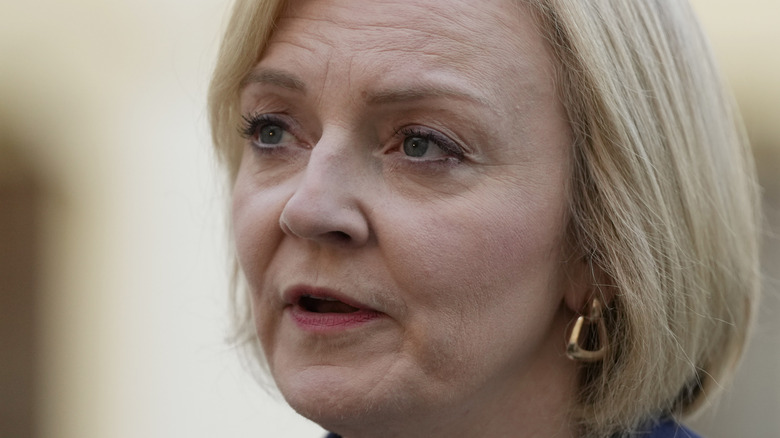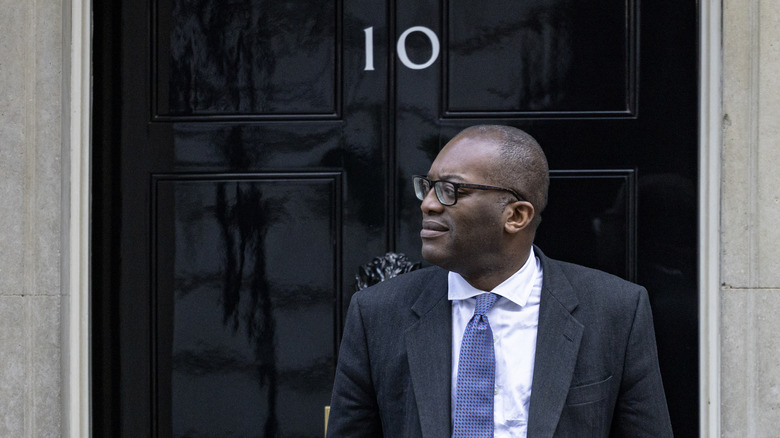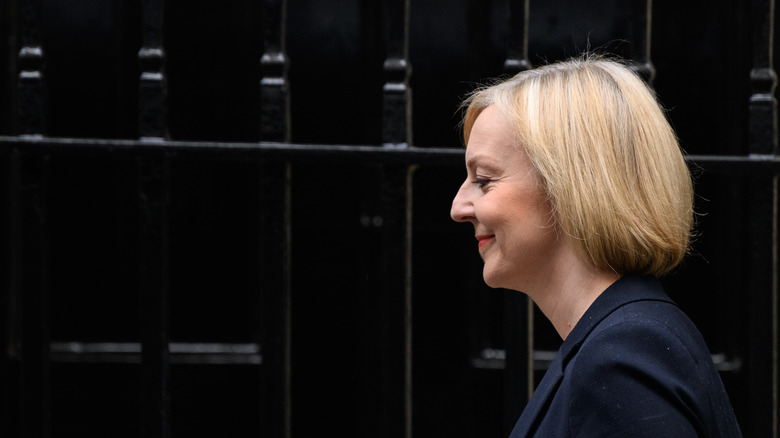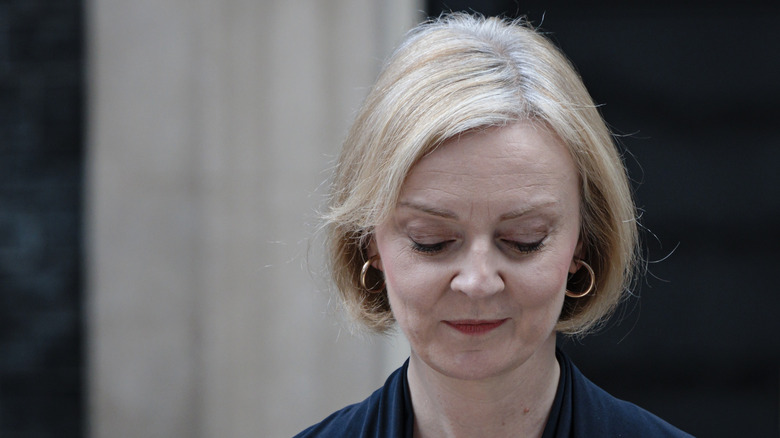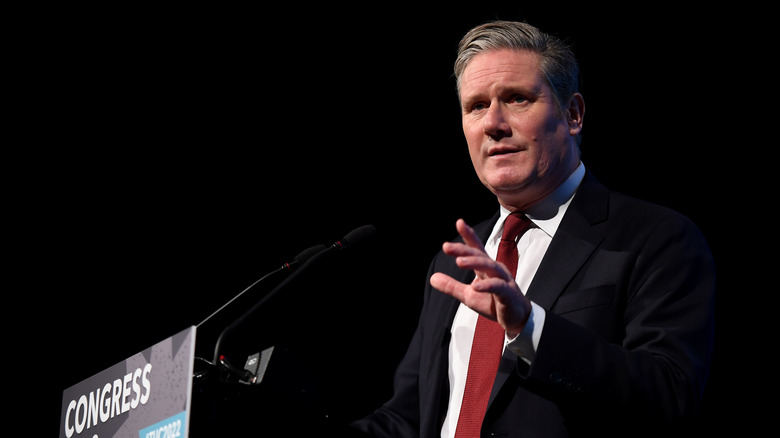What We Know About Liz Truss' Resignation As Prime Minister Of The UK
On Thursday, October 20, 2022, Liz Truss, the prime minister of Great Britain and Northern Ireland, stood behind a lectern at 10 Downing Street — the Cabinet Office for the British government and the home of the prime minister during their period in the job — and told the assembled British news media that she was resigning from the most powerful political office in the country (via The Guardian).
Truss' stay in Downing Street has turned out to be one of the shortest in British political history, terminating less than two months after she officially ascended to the role. Many pointed out at the time that Truss' transition to 10 Downing Street was something of a "baptism of fire," per The New Indian Express. On Tuesday, September 6, 2022, Truss was pictured meeting Queen Elizabeth II, who formally asked Truss, the leader of the largest party in the House of Commons, to form a government. Two days later, the queen was dead, and the images of her shaking hands with Truss — who also received ample criticism for her seeming inability to curtsey correctly in front of the monarch — turned out to be those of the queen's last-ever public appearance.
Just 45 days later, Truss herself was already preparing to leave the world stage. So what exactly caused this unprecedented churn of power at the highest level of British politics ... and what on earth comes next?
Why is Liz Truss going?
It seems impossible that the leader of a country could have their authority drain away so freely over the course of just a month and a half that they would be forced to resign. But that is exactly what happened with Liz Truss, who bound into the prime ministerial role promising the instillation of "trickle down" economic policies that some media outlets deemed "Trussonomics" (via CNBC). Such policies involved tax cuts for businesses and high earners among a bevy of other right-wing maneuverings.
Like Boris Johnson before her, Truss assembled a cabinet of ministers based on their perceived loyalty rather than ability, installing her close friend and ally Kwasi Kwarteng (above) to the role of Chancellor of the Exchequer. She first tasked him to help jointly deliver an economic package her team had deemed a "mini-budget," meaning that, as it wasn't an official budget announcement, it could evade scrutiny from external bodies such as the Bank of England, per the BBC. However, Truss and Kwarteng's "mini-budget" was a disaster, spooking the markets and outraging the general public, who were in the midst of dealing with a swelling cost of living crisis, according to The Guardian. Truss' government was forced to backtrack, U-turning on policy after policy, while Truss had to fire Kwarteng and install the non-sympathetic Jeremy Hunt as chancellor to calm the markets. Hunt promptly shredded each of Truss' policies, leaving her a prime minister in name only and with no mandate to govern.
A day of chaos
Things really came to a head for Liz Truss and her Conservative government on the evening of Wednesday, October 20, 2022, when the British Parliament descended into chaos and scuffles, with several of Truss' own members of parliament (MPs) speaking to the press to express their anger and outrage at the latest developments. Earlier in the day, Truss' Home Secretary Suella Braverman (above) — who had become notorious in recent days for telling the press she had "dreams" of sending planeloads of refugees to Rwanda and for failing to toe the party line on policy (per HuffPost) — resigned her post. The move came after it emerged that she had sent confidential emails to Downing Street staff from her personal email account, breaching the ministerial code in the process. She left with a furious parting shot at Truss, writing in reference to the disastrous mini-budget (via The Guardian): "Pretending we haven't made mistakes, carrying on as if everyone can't see that we have made them, and hoping that things will magically come right is not serious politics."
Later in the day, the government installed a three-line whip — an instruction to their own MPs to vote with the government at risk of disciplinary action, including expulsion from the party — to vote down a motion brought by the Labour Party to ban fracking. Many Conservative MPs were incensed, with reports of "manhandling" and intimidation (per The Conversation) in the voting lobbies proving that Truss' government was now irreparably fractured (via The Guardian).
What happens next?
As she stood outside 10 Downing Street for possibly the last time and offered her resignation, Liz Truss explained the steps that would follow in the coming days as her government is dissolved. "This morning I met the chair of the 1922 Committee, Sir Graham Brady," she said (via The Guardian). "We have agreed there will be a leadership election to be completed in the next week. This will ensure we remain on a path to deliver our fiscal plans and maintain our country's economic stability and national security. I will remain as prime minister until a successor has been chosen."
It was the arrival of Sir Graham Brady at Downing Street an hour before Truss' appearance that sent political commentators into a frenzy of anticipation. With Truss' authority hanging by a thread, a visit by Brady — whose committee effectively regulates the make-up of the Conservative Party and dictates the rules by which its leaders are selected — suggested that Truss was being told by the upper echelons of her own party to walk before she was pushed. Brady later addressed the press himself, explaining that by October 28, Conservative MPs would vote on a new leader, and the party membership would "be involved" in the process (via The Guardian).
Why such a quick turnaround?
The selection of a new Conservative leader and prime minister of Great Britain and Northern Ireland will happen in a week, according to Liz Truss and the chairman of the 1922 Committee, Graham Brady (via The Guardian). Commenters have noted that this is in stark contrast to the extended leadership competition undertaken in the summer of 2022, which eventually saw Truss take power ahead of several other prominent Conservative politicians who were vying for their turn in the hot seat. In that contest, the eventual leader was chosen over the course of four rounds of votes by MPs, in which several would-be leaders were gradually whittled down to two — Truss and Rishi Sunak. The final choice was given to party members, meaning that just 141,000 voters, or 0.3% of the electorate, had a say on the next prime minister (per The Guardian).
This time, the vote will likely take place primarily among MPs and with a high bar for entry, meaning both that a result can be reached in a shorter time frame and that the leader selected should — in theory, at least — command the support of a majority of their own party. The speed with which the next prime minister is being selected is due to the need of the government to quickly address the chaos of the previous weeks caused by Truss' "mini-budget," with the new leader hopefully in place before the next budget announcement that has been scheduled for October 31, 2022, per the Financial Times.
How does Truss' brief spell in power compare?
Liz Truss' resignation is historic for many reasons. Lasting just 45 days, her tenure as prime minister is officially the shortest in British history, according to The Guardian. The leadership contest to select her, which ran from July to September 2022, took longer than it took for her government to crumble. The same source notes, however, that she is not among the very shortest-term leaders in world history: Lady Jane Grey, the "nine days queen," and Mexican President Pedro Lascuráin, who lastest just 45 minutes, undercut her longevity by a wide margin.
However, the promise of a fresh leadership election within the Conservative Party is also historic, with former Prime Minister Boris Johnson having only just resigned in July in the wake of a tornado of scandals. This means the U.K. will have had three different prime ministers in a single calendar year for the first time, while Truss is also the only prime minister to have lasted less than a year in the job, according to History.
As Truss' power was ebbing away, the British tabloid asked whether the embattled prime minister would be able to outlast the shelf-life of a supermarket lettuce (via Reuters). She couldn't.
How do things look for the next UK government?
Those at the top of the Conservative Party likely hope that bringing a new leader to the helm of government will steady the boat, which has become increasingly chaotic since the resignation of David Cameron following his defeat in the Brexit referendum in 2016 (per The Guardian). Still, experts from across the political spectrum — including several anonymous sources from the party itself — think that the Conservatives have hit a terminal velocity in 2022. Despite their best attempts, many now believe that the Conservative Party shall soon be out of power, according to polling by YouGov.
Though putting the leadership contest in the hands of MPs themselves rather than party members should help to ensure that a more stable and cohesive prime minster is selected before the end of October, the Conservative Party itself has ceased to be a viable option for many voters after months of unadulterated chaos. Approval ratings for individual politicians and the party itself are at an all-time low, while the rival Labour Party has been in the ascendency. Many opposition MPs, including Labour Party leader Sir Keir Starmer (pictured), have already made fresh calls for a general election, though none is officially due before 2024, per The Guardian.
So far, Conservatives are resisting the call, hoping they can rally behind a new — or perhaps old — leader. As reported by Sky News, one Conservative MP claimed to be echoing the sentiments of his constituents when he told an interviewer: "Bring back Boris."
